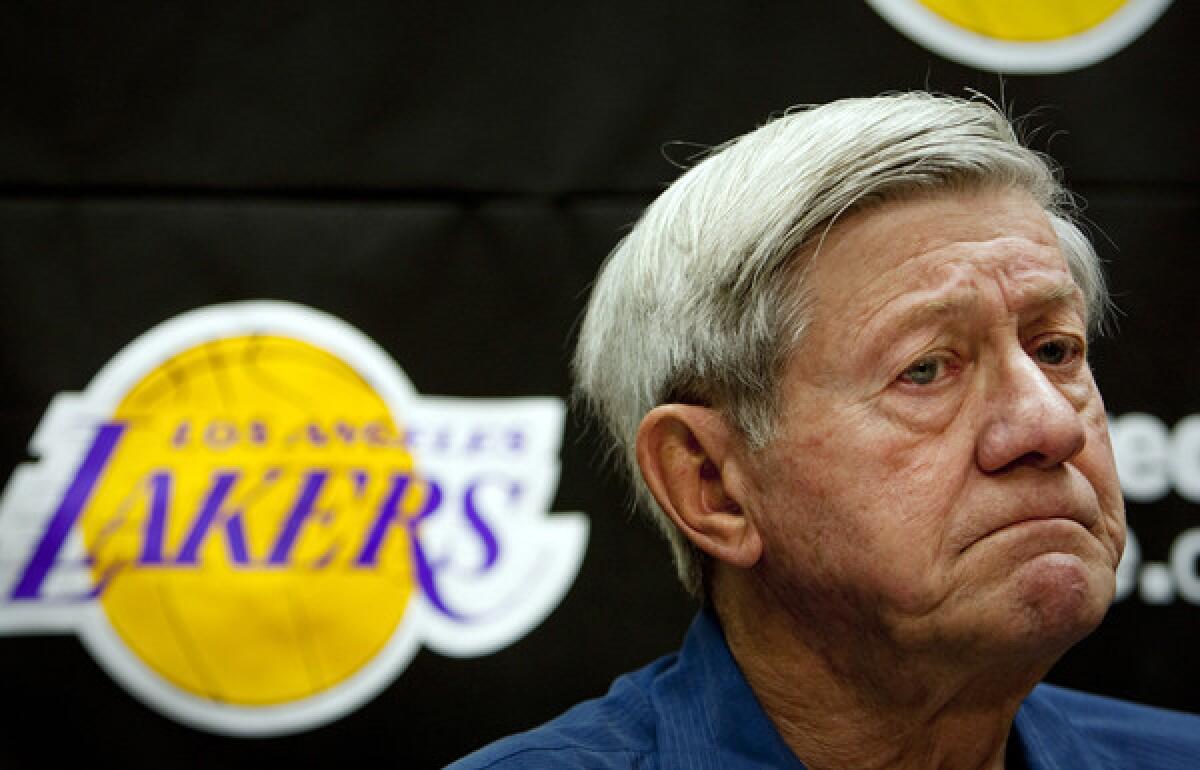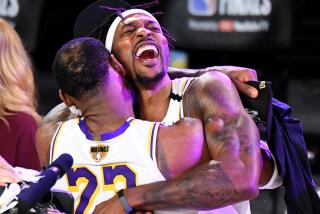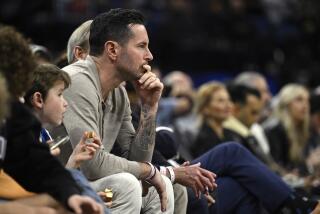And now, the rest of the story about Jerry Buss

It took several cups of coffee and a couple of hours one recent morning to realize there was still so much more to know about Jerry Buss.
The coffee was shared with Bob Steiner, Buss’ longtime public relations advisor and general confidant. We reminisced and rambled.
There were the general pearls: “He could never accept rebuilding,” Steiner said. “That was him.”
There were curtains drawn back on his way of doing business: “Some of his business friends thought he was a terrible negotiator,” Steiner said. “This is how he approached it. He would [figuratively] put on the other person’s hat and see what that person would get out of the negotiations. Then he would put on his own hat and see what good was coming his way. When he saw both sides getting something, he was happy. On one trade we made, Jerry saw that the other side was getting shorted. He liked the other owner, so he threw in another player.”
There was this new wrinkle: “The decision to fire Paul Westhead [early in the 1981-82 season] was made three days before we announced it. In that time, Magic [Johnson] said he wanted to be traded. So when we let Paul go, he became the coach that Magic fired, and that impression remains today. That played a big role in the recent Mike Brown case. Once it was decided Mike would be let go, Jerry said, ‘Let’s do it right away.’ He didn’t want a repeat of Magic-Westhead.”
Steiner said that when it became clear that Westhead and his team weren’t in sync, Buss asked for a meeting with Pete Newell, longtime basketball coaching legend at California and a friend of Steiner’s.
“Jerry had great respect for Pete and wanted to figure out why everybody was unhappy with Westhead,” Steiner said. “He told Newell he wanted to save his coach, not fire him. He wanted Pete to tell him what he could do to save him. Pete told him there was nothing he could say.”
The beginning of Lakers “Showtime” in the Magic Johnson era may have begun with a sportswriter’s line or a marketing campaign. But it had begun long before in Buss’ heart.
“He used to go to a nightclub in Santa Monica called the Horn,” Steiner said. “The master of ceremonies would announce the main act, comedian Sammy Shore. He’d say: ‘Now, it’s show time.’ Jerry loved that. He said it always got him excited.”
Steiner said that the way Buss has split the Lakers into family shares is consistent with his humble roots and desire to make things better for his family.
“He talked about driving to the top of a hill with his stepfather when he was a kid in Kemmerer, Wyo.,” Steiner said. “That was the only way they could get radio reception for University of Wyoming basketball. He read the Salt Lake City Tribune every day, and when I mentioned I knew the sports editor and columnist there, John Mooney, he got excited and I scheduled a lunch with him.
“When he formed the Laker Girls, the first head of it was his niece, Becky. She had been a song girl at USC.”
Buss loved boxing, but wasn’t a good negotiator about that, either. He called in eventual director John Jackson when they were creating Forum Boxing, Steiner said.
“He asked John if they could make a profit on boxing,” Steiner said. “Jackson said no. He asked if they could break even. Jackson said no. Then he said, ‘Well, dammit, can we try not to lose a lot?’”
And with that auspicious business plan, Forum Boxing was begun.
Buss was an old softy, and was never particularly confrontational.
“We had a young player named Ollie Mack,” Steiner said. “Jerry loved him. They hit it off. He had him over to Pickfair [the Beverly Hills mansion Buss owned for many years] to shoot pool. Then we traded him. Jerry was devastated.”
Then there was the night broadcaster Chick Hearn wasn’t feeling well, his voice was going and Lakers officials asked Steiner to find Buss at halftime. They were getting complaints that listeners couldn’t hear Hearn.
“I understood we had to get him off,” said Steiner, who also knew how protective Hearn was of his long streak of broadcasting games. “I went to Jerry’s box, told him, and he said, ‘Oh, no. Don’t get me involved in that.’”
Steiner went to deliver the news. Hearn refused to relinquish the microphone.
“His wife, Marge, was there and saved the day,” Steiner said. “She told him even Lou Gehrig had some one-at-bat games.”
Hearn yielded the microphone to Stu Lantz and Jerry West, Steiner said, and Hearn was back for the next game, streak intact.
Steiner said that, in all their years together, he and Buss never had a fight, not even a raised voice.
“The closest we came,” Steiner said, “was when I mishandled something and he said to me, ‘I don’t think I explained that well enough.’ That was how he handled things. He made my mistake seem like his.”
As the coffee pot ran low, there was a final flash of realization of the once-in-a-lifetime figure we were discussing. The conversation had taken us to the apparent dysfunction leading up to the 2009-10 Phil Jackson-Kobe Bryant NBA titles. Steiner mulled it.
“When you think of it, this is what you had,” Steiner said. “First, there was Kobe, caught by some TV cameras, calling Dr. Buss an idiot. Then you had Phil, coaching Kobe again after writing a book in which he called Kobe uncoachable. And what’s happening? We are winning NBA titles.”
That could work only for somebody who could persevere through chaos, never stop caring and never stop having fun.
Ah, yes. Jerry Buss.
More to Read
Go beyond the scoreboard
Get the latest on L.A.'s teams in the daily Sports Report newsletter.
You may occasionally receive promotional content from the Los Angeles Times.











